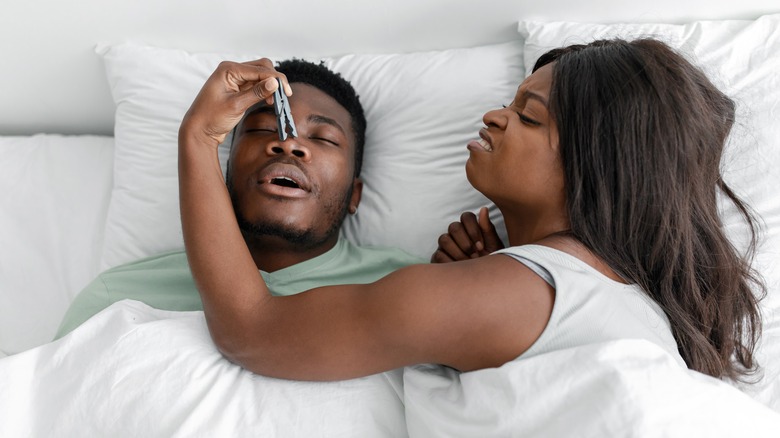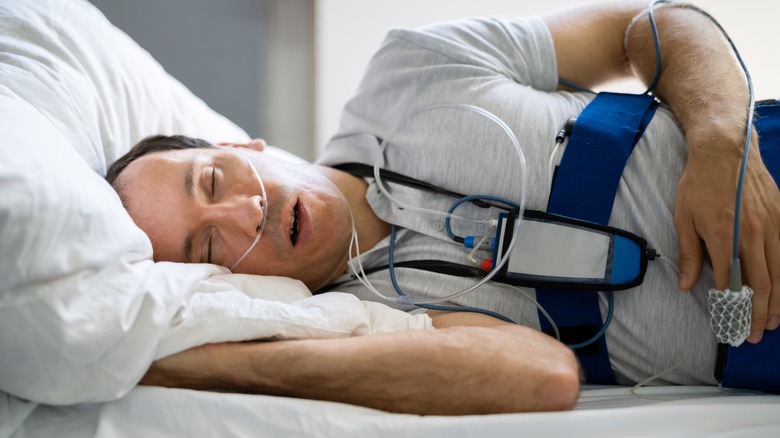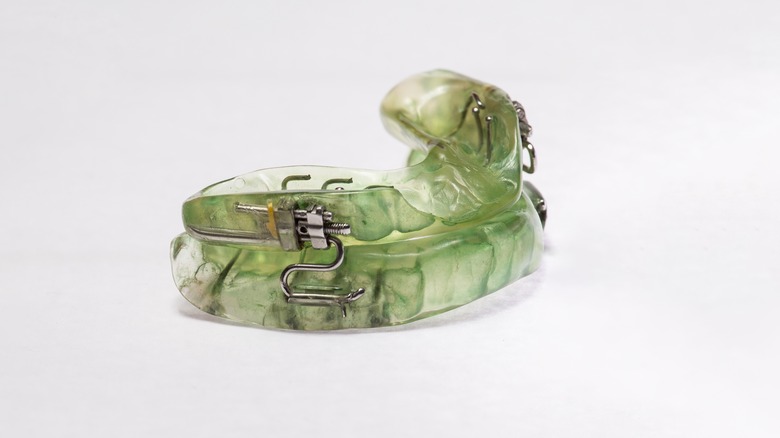Can A Mouthguard Prevent Sleep Apnea?
If '90s cartoons are to be believed, snoring is the only surefire way to tell that someone is sleeping. Sawing logs and catching some Zs — two common expressions for getting some sleep — even sound like the sort of thing you have to snore to achieve. As Harvard Health Publishing puts it, there is good reason for the stereotype. Somewhere in the ballpark of 90 million Americans snore when they sleep. And, luckily, most of those people are sleeping fine and apnea-free.
As outlined by the Sleep Foundation, less than 1% of American adults live with central sleep apnea while 10-30% seem to be affected by obstructive sleep apnea. That may seem like a wide margin but, as the foundation explains, many cases of obstructive sleep apnea are undiagnosed despite the condition's potential long-term health effects.
This may be in part due to the condition's symptoms. In addition to loud snoring, the Sleep Foundation lists loss of focus, daytime sleepiness, morning headaches, irritability, and a dry mouth in the morning. Every one of these symptoms can be chalked up to other conditions like the notoriously troublesome issue of chronic stress. But when they occur together, it's important to see a doctor that can handle diagnosis and treatment.
Sleep apnea diagnostic methods
There are many sleep apnea treatment options, most of which are minimally invasive. Before the condition can be treated, however, it must be diagnosed. In some cases, a doctor will hear a patient's account of their symptoms and, if possible, talk to someone who sleeps in close proximity to that person (via the Mayo Clinic).
Other diagnostic measures include sleep tests to measure breathing patterns and airflow as well as several other factors, according to Mayo Clinic. The doctor may then make a diagnostic call based on the test results. If the results are inconclusive, the patient may also receive a nocturnal polysomnography test. This kind of test is conducted while the patient is asleep and able to be observed by a medical practitioner (via Healthline).
Any one of these diagnostic methods may reveal that someone is living with sleep apnea. When this happens, they move into the treatment phase. Most of these involve adjusting the air pressure in a person's airways, usually through machines. But some people try to use mouthguards and may be left wondering if their device is actually having a positive effect on their condition.
How effective are mouthguards?
Of the many treatment options available for sleep apnea, the most commonly known is probably the CPAP machine. The acronym stands for continuous positive airway pressure, which Harvard Health Publishing explains is a machine that continuously blows a stream of air into a person's airways through a mask either over the nose or over both the nose and the mouth.
CPAP is the most common treatment option, but as Harvard Health points out, they aren't the most affordable or convenient. In that case, people may turn to mouthguards instead. But, unlike the generic mouth guards bought in stores, sleep apnea treatments are called oral devices. They are made by the patient's dentist and keep both the jaw and tongue in the proper place while the patient sleeps.
Convenience and reduced cost aside, there is a serious drawback to oral devices for sleep apnea. It turns out that oral devices don't do much for people living with obstructive sleep apnea. According to The Sleep Foundation, CPAP treatments "greatly outperform" oral appliances. Doctors, therefore, reserve these alternative options for people who cannot tolerate sleeping with a mask on.



